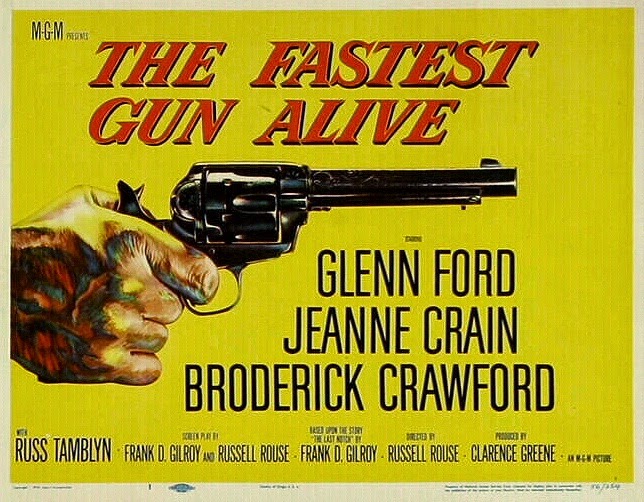Here
is an often overlooked Western that foregoes the wild, wide open spaces and much
of the action to be found in most “oaters”. That is perhaps why it does tend to get overlooked and is
seldom included on lists of Best or Favorite Western films.
Nevertheless,
it is quite a good feature. It’s heavy on atmosphere and drama, features very
little in the way of humor (except in an early barn dance sequence that
includes a prolonged and awkwardly out-of-place dance number by Russ Tamblyn,
showing up here in between appearances in bigger, splashier movies like Seven Brides For Seven Brothers and West Side Story), and boasts several fine performances by a number of veteran
actors.
The
plot is centered around quiet, unassuming store clerk George Temple (Glenn
Ford) who, along with his wife Dora (Jeanne Crain), has been running the
general store in Cross Creek for the past four years. What no one else knows is
that George has a tortured past. His father was a notorious gunfighter turned
lawman who taught George how to handle a gun until the kid became faster and
better at it than his teacher. But when his father was killed from ambush, George
discovered that, no matter how good he was with a gun, he lacked the fortitude
to use one against another man, not even the killer of his father. His guilt
over this has kept him running ever since, spurred on by periodically
displaying his gun prowess to others only to have to move on immediately afterward
for fear of the fast guns that will inevitably come flocking to test him.

When
frustration causes George to once more reveal his secret to the stunned
citizens of Cross Creek, the inevitable then must follow: Word will spread,
fast guns will start showing up, the quiet little town will be disrupted and
threatened, and George will have to start facing the challenges … or again
slink away.
This
time, the townsfolk convince him to stay. They do so by promising --- actually swearing
to it in church --- to keep his secret. Almost immediately, however, that
promise is broken in an unexpected way and exactly as (in a rather wild
coincidence that stretches credibility mighty thin) a notorious, nearly
psychotic gunfighter named Vin Harold happens to be passing through. Naturally,
Harold insists on a showdown to see who is fastest. He threatens to literally burn
down the town if his challenge is not met.
I
can’t say too much more without spoiling what is a surprising, wholly
satisfying ending with a nifty twist.
In
addition to Ford, Crain, and Crawford, the cast contains a whole host of
recognizable character actors including such stalwarts as Noah Berry Jr., John
Dehner, Leif Erickson, Paul Birch, Dub Taylor, Virginia Gregg, and John Doucette.
Ford is typically low key which is especially effective here, Crain looks a
little too beautiful for a small town storekeeper’s wife but does a nice
underplayed acting job, Erickson and Gregg are solid, and Dehner damn near
steals the whole picture as one of Vinnie Harold’s cronies. Noah Berry, who almost
always does a fine job, is disappointingly flat here. And Academy Award-winning
Crawford (no, not for this film) over-acts to the point of practically making
his character more comic than menacing.
The
Fastest Gun Alive was directed and co-written by Russell Rouse. His co-author
for the screenplay was Frank D. Gilroy who originally did a version of the story
as a teleplay.
Worth
checking out as a slightly offbeat, though still reasonably traditional,
Western.












